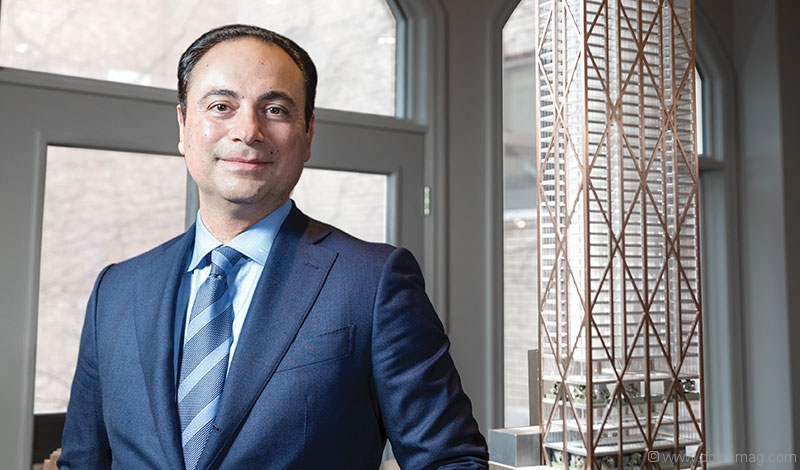Sam Mizrahi Mizrahi Developments

Sam Mizrahi
President and CEO, Mizrahi Developments.
When Sam Mizrahi, president of Mizrahi Developments, set his sights on the most famous intersection in the blossoming metropolis of Toronto, he knew it was The One.
Today, that corner of Yonge and Bloor is now the future home of One Bloor West, Toronto’s most anticipated retail and residential structure that promises to scrape the sky in the most beautiful way.
It’s not just this soon-to-be landmark that has placed Mizrahi on the map as one of the country’s most influential luxury real estate developers. The businessman has made waves in this high-stakes industry since he first set foot in it after years of heading a luxury dry-cleaning business in the city.
While he wasn’t always a real estate mogul, building luxury homes has always been on Mizrahi’s radar.
“I fell in love with design and architecture and function and form when I was 16 years old,” says Mizrahi. “Real estate gives you the opportunity to create all of those things — to create art, really. The interest really started when I began travelling and looked at buildings around the world, how unique and beautiful they were, and how they formed an important fabric of society.”
The Toronto skyline is happy he brought these experiences home with him, along with the mission to blanket the city with unique design. The structures brought to life by Mizrahi and his team seem to speak another language, one that’s new and intriguing to the city and the Greater Toronto Area. By blending old-world heart with modern craftsmanship, style and innovation, Mizrahi Developments unveils residential structures that not only are inspiring to look at, but also challenge the industry to join in taking the city’s structures to the next level.
“If i could go back to myself 20 years ago and say one thing, i think it would be to watch for big problems, because they often disguise very big opportunities”
Complementing Mizrahi’s passion for quality creations is his dedication to respecting the communities he builds in as much as he enriches them.
“The very first thing we do when entering a market we’re building in is engage with the community,” says Mizrahi. “The community tells us what they want in that market, and we mirror what that is. So we collaborate with them, and we start to develop and reverse-engineer the building based on what the community is saying to us. We look at how we can benefit the community as a whole so that by us coming into the community, we’re actually benefiting the neighbourhood experience.”
Like all good businesspeople, Mizrahi has also mastered the art of balance. A husband and father, he’s as much a family man as he is a businessman — and he makes it his priority to build up his loved ones like he builds up his developments. Of course, it’s a challenging feat when you clock 12 hours a day and travel an average of 30,000 kilometres a year (he’s jetted from Dubai to Israel, from France to Italy, from the U.K. to China and beyond). But he attributes his juggling act to simply making it happen.
“The balance doesn’t happen organically — you have to make it happen,” says Mizrahi, who has a 10-year-old daughter and an eight-year-old son. “It’s as simple as that. There are incredible time constraints in both my business and in my family, so I make a point of making time for my family. They’re very supportive of my passions, and at the same time I’m extremely supportive of them, so we create the time and the balance together.”
Mizrahi has another passion outside of work: the UJA Federation of Greater Toronto. He’s an avid supporter of the organization, whose mission is to preserve and strengthen the quality of Jewish lives in and around the city, across Canada and internationally. Not only is it a cause that’s close to Mizrahi’s heart, but it’s also through his involvement with the UJA that he’s met some of his dearest friends.
Having spent over two decades in the industry, Mizrahi has learned enough to write a book about how to navigate an extremely influential brand through even the toughest of adversities. But the lesson that he cherishes the most is one that can be translated into any industry, any age and any dream: “If I could go back to myself 20 years ago and say one thing,” he says, “I think it would be to watch for big problems, because they often disguise very big opportunities.”
Photo By Robin Gartner




















































































No Comment